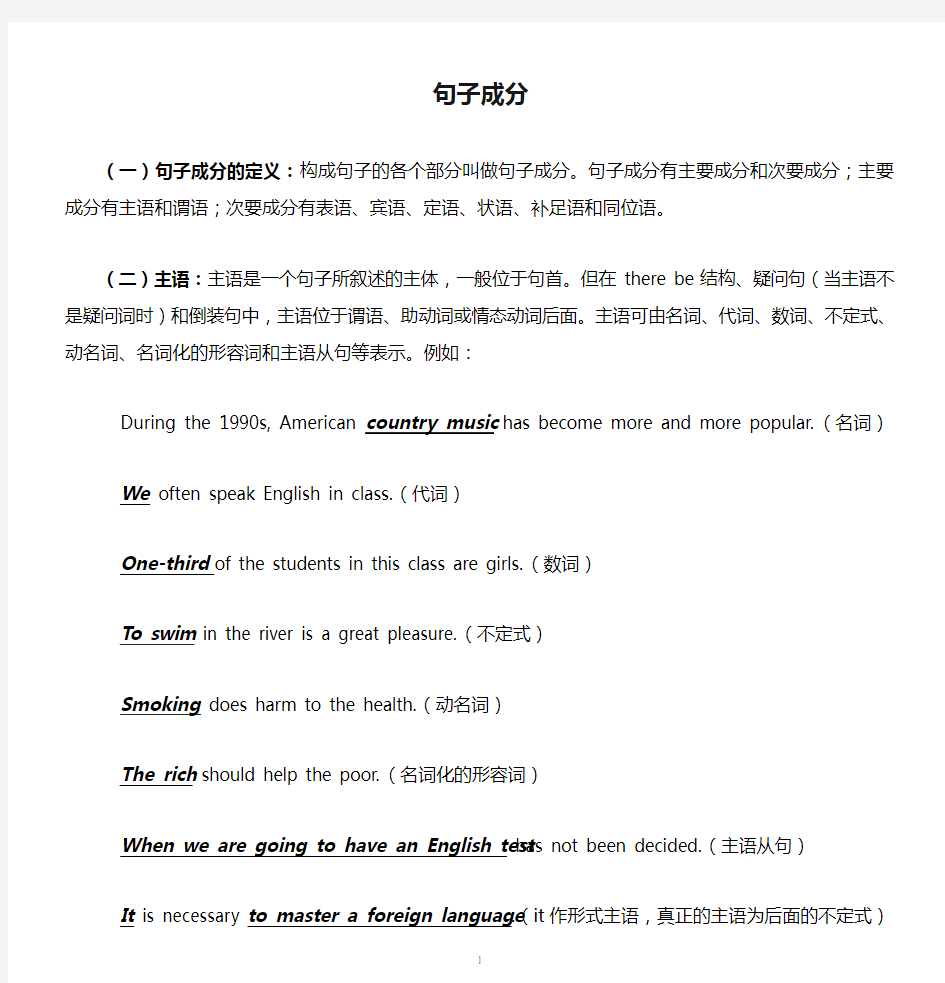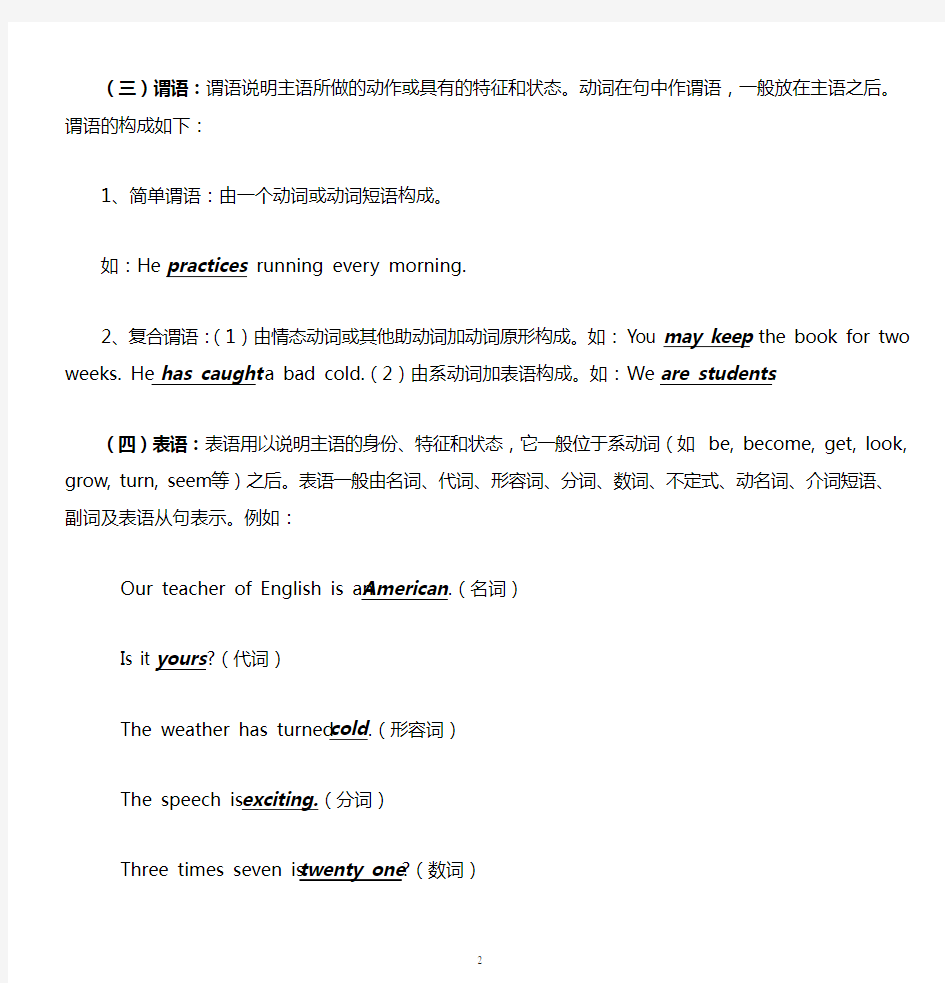

句子成分
(一)句子成分的定义:构成句子的各个部分叫做句子成分。句子成分有主要成分和次要成分;主要成分有主语和谓语;次要成分有表语、宾语、定语、状语、补足语和同位语。
(二)主语:主语是一个句子所叙述的主体,一般位于句首。但在there be结构、疑问句(当主语不是疑问词时)和倒装句中,主语位于谓语、助动词或情态动词后面。主语可由名词、代词、数词、不定式、动名词、名词化的形容词和主语从句等表示。例如:During the 1990s, American country music has become more and more popular.(名词)
We often speak English in class.(代词)
One-third of the students in this class are girls.(数词)
To swim in the river is a great pleasure.(不定式)
Smoking does harm to the health.(动名词)
The rich should help the poor.(名词化的形容词)
When we are going to have an English test has not been decided.(主语从句)
It is necessary to master a foreign language.(it作形式主语,真正的主语为后面的不定式)
(三)谓语:谓语说明主语所做的动作或具有的特征和状态。动词在句中作谓语,一般放在主语之后。谓语的构成如下:
1、简单谓语:由一个动词或动词短语构成。
如:He practices running every morning.
2、复合谓语:(1)由情态动词或其他助动词加动词原形构成。如:You may keep the book for two weeks. He has caught a bad cold. (2)由系动词加表语构成。如:We are students.
(四)表语:表语用以说明主语的身份、特征和状态,它一般位于系动词(如be, become, get, look, grow, turn, seem等)之后。表语一般由名词、代词、形容词、分词、数词、不定式、动名词、介词短语、副词及表语从句表示。例如:
Our teacher of English is an American.(名词)
Is it yours?(代词)
The weather has turned cold.(形容词)
The speech is exciting.(分词)
Three times seven is twenty one?(数词)
His job is to teach English.(不定式)
His hobby(爱好)is playing football.(动名词)
The machine must be out of order.(介词短语)
Time is up. The class is over.(副词)
The truth is that he has never been abroad.(表语从句)
(五)宾语:宾语表示动作的对象或承受者,一般位于及物动词和介词后面。例如:
They went to see an exhibition(展览)yesterday.(名词)
The heavy rain prevented me from coming to school on time.(代词)
How many dictionaries do you have? I have five.(数词)
They helped the old with their housework yesterday.(名词化形容词)
He pretended not to see me.(不定式短语)
I enjoy listening to popular music.(动名词短语)
I think(that)he is fit for his office.(宾语从句)
宾语种类:
(1)双宾语(间接宾语+直接宾语).
例如:Lend me your dictionary, please.
(2)复合宾语(宾语+宾补).
例如:They elected him their monitor.
(六)宾语补足语:英语中有些及物动词,除有一个直接宾语以外,还要有一个宾语补足语,才能使句子的意义完整。带有宾语补足语的一般句型为:某些及物动词(如make等+宾语+宾补)。宾补可由名词、形容词、副词、不定式、分词、介词短语和从句充当。例如:His father named him Dongming.(名词)
They painted their boat white.(形容词)
Let the fresh air in.(副词)
You mustn’t force him to lend his money to you.(不定式短语)
We saw her entering the room.(现在分词)
We found everything in the lab in good order.(介词短语)
We will soon make our city what your city is now.(从句)
(七)定语:修饰名词或代词的词、短语或从句称为定语。定语可由以下等成分表示:
Guilin is a beautiful city.(形容词)
China is a developing country; America is a developed country.(分词) There are thirty women teachers is our school.(名词)
His rapid progress in English made us surprised.(代词)
Our monitor is always the first to enter the classroom.(不定式短语) The teaching plan for next term has been worked out.(动名词)
He is reading an article about how to learn English.(介词短语)(八)状语:修饰动词、形容词、副词或整个句子,说明动作或状态特征的句子成分,叫做状语。可由以下形式表示:
Light travels most quickly.(副词及副词性词组)
He has lived in the city for ten years.(介词短语)
He is proud to have passed the national college entrance examination.(不定式短语)
He is in the room making a model plane.(分词短语)
Wait a minute.(名词)
Once you begin, you must continue.(状语从句)
状语种类如下:
How about meeting again at six?(时间状语)
Last night she didn’t go to the dance party because of the rain.(原因状语)
I shall go there if it doesn’t rain.(条件状语)
Mr Smith lives on the third floor.(地点状语)
She put the eggs into the basket with great care.(方式状语)
She came in with a dictionary in her hand.(伴随状语)
In order to catch up with the others, I must work harder.(目的状语) He was so tired that he fell asleep immediately.(结果状语)
She works very hard though she is old.(让步状语)
I am taller than he is.(比较状语)
简单句、并列句和复合句
(一)句子种类两种分类法
1、按句子的用途可分四种:
1)陈述句(肯定、否定):He is six years old; She didn’t hear of you before.
2)疑问句(一般、特殊、选择、反意):Do they like skating? How old is he? Is he six or seven years old? Mary can swim, can’t she?
3)祈使句:Be careful, boys; Don’t talk in class
4)感叹句:How clever the boy is!
2、按句子的结构可分三种:
1)简单句:只有一个主语(或并列主语)和一个谓语(或并列谓语)。
例如:l. He often reads English in the morning.
Tom and Mike are American boys.
She likes drawing and often draws pictures for the wall newspapers.
2) 并列句:由并列连词(and, but, or等)或分号(;)把两个或两个以上的简单句连在一起构成。
例如:You help him and he helps you. The future is bright; the road is tortuous. 前途是光明的,道路是曲折的。
3)复合句:含有一个或一个以上从句的句子。复合句包含:名词性从句(主语从句、宾语从句、表语从句和同位语从句)、定语从句和状语从句等。
例如:The foreign visitors took a lot of pictures when they were at the Great Wall.
(二)简单句的五种基本句型
1、主语+系动词+表语:e. g. He is a student.
2、主语+不及物动词:e. g. We work.
3、主语+及物动词+宾语:e. g. Henry bought a dictionary.
4、主语+及物动词+双宾语(间接宾语+直接宾语):e. g. My father bought me a car.
5、主语+及物动词+复合宾语(宾语+宾补):e. g. Tom made the baby laugh.
注:其他各种句子都可由这一种基本句型扩展、变化或省略而构成。
●主语---系动词----表语:
在这一句型中,动词是系动词,划线部分为表语。
1. Mr. Brown is an engineer. (名词作表语)
2. Gradually he became silent. (形容词作表语)
3. She remained standing for a hour. (现在分词作表语)
4. The question remained unsolved. (过去分词作表语)
5. The machine is out of order. (介词短语作表语)
6. The television was on. (副词作表语)
7. His plan is to keep the affair secret. (动词不定式作表语)
8. My job is repairing cars. (动名词作表语)
9. The question is what you want to do. (从句作表语,即:表语从句)
注意:在下面的句子中,形容词作表语,在表语的后面常常接不定式结构。
I’m happy to meet you.
They are willing to help.
We are determined to follow his example.
●主语———动词:
在这一句型中,动词为不及物动词及不及物的动词词组。在有的句子中,不及物动词可以有状语修饰。
1. The sun is rising.
2. I’ll try.
3. Did you sleep well?(well做状语,修饰不及物动词sleep)
4. The engine broke down.
注意:在此句型中,有少数不及物动词表达被动含义,表达主语本身所具有的特性,不用被动语态。
1. The book sells well.
2. The window won’t shut.
3. The pen writes smoothly.
4. Cheese cuts easily.
●主语———动词———宾语:
在此句型中,动词为及物动词,划线部分为宾语。
1. Do you know these people (them)?(名词或代词作宾语)
2. I can’t express myself in English. (反身代词作宾语)
3. He smiled a strange smile. (同源宾语)
4. We can’t afford to pay such a price. (不定式作宾语)
5. Would you mind waiting a few minutes?(动名词作宾语)
6. I hope that I have said nothing to pain you. (从句作宾语,即:宾语从句)
注意:并不是所有的及物动词都可以接上述各种情况作宾语,不同的动词有不同的用法,所以,在学习动词时,一定要掌握其用法。
●主语———动词———宾语———宾语:
在此句型中,动词可以称作双宾语动词,在英语中,这样的动词并不多,在学习中遇到时,要牢记。后面的宾语为间接宾语和直接宾语,其中,间接宾语在前,一般表人,直接宾语在后,一般表物。这类句型有三种情况。
第一种情况,间接宾语可以改为由to引导的短语。
1. He handed me a letter. →He handed a letter to me.
2. She gave me her telephone number.
→She gave her telephone number to me.
第二种情况,间接宾语可以改为由for引导的短语。
3. She sang us a folk song. →She sang a folk for us.
4. She cooked us a delicious meal.
→She cooked a delicious meal for us.
第三种情况,直接宾语可以由宾语从句充当。
5. Tell him I’m out.
6. Can you inform me where Miss Green lives?
●主语———动词———宾语———宾语补足语:
在此句型中的动词,叫做可以跟复合宾语的动词,在英语中,这样的动词也不多。后面的宾语补足语是说明宾语的情况的,宾语和宾语补足语一起被称作复合宾语。这个句式是英语中比较复杂的一个句式,因为复合宾语的构成内容较多。下面句子中划线部分为宾语补足语。
1. He found his new job boring. (形容词作宾补)
2. The called their daughter Mary. (名词作宾补)
3. This placed her in a very difficult position. (介词短语作宾补)
4. We went to here house but found her out. (副词作宾补)
5. What do you advise me to do?(不定式作宾补)
6. We thought him to be an honest man. (to be作宾补)
7. He believed them to have discussed the problem. (不定式的完成式作宾补)
8. He believed her to be telling the truth. (不定式的进行式作宾补)
9. Did you notice him come in?(不带to的不定式作宾补)
10. I saw her chatting with Nancy. (现在分词作宾补)
11. He watched the piano carried upstairs. (过去分词作宾补)
注意:在这个结构中,可以出现用it作形式上的宾语,把真正的宾语放在宾语补足语的后面。在此结构中,宾语常常是动词不定式或宾语从句。
1. He felt it his duty to mention this to her.
分析:it是形式宾语,his duty是宾语补足语,to mention this to her 是真正的宾语。
2. I think it best that you should stay with us.
分析:it是形式宾语,best是宾语补足语,that you should stay with us是真正的宾语。
3. there be句型是一种特殊的句子,真正的主语在后面,含义为“有……”
①谓语动词和主语保持一致:There is a television in the sitting room.
②有两个或更多的主语时,动词一般和最近的一个保持一致:
There are two girls and a boy dancing in the hall.
③主语的后面有时有修饰语:There are a lot of difficulties facing
us. There were many things to be done(此处也可以使用to do).
④谓语动词be可以有时态的变化:There will be a concert in the
park tonight. There was little change in him.
⑤谓语也可以有不定式构成的复合谓语。
There used to be a cinema here.
There seems to be something the matter with her.
Is there going to be any activity tonight?
⑥there be句式变疑问句,把be提前;变反意疑问句也要借助there。
Is there any hope of getting the job?
There is nothing wrong with your watch,is there?
⑦there be句型中也可以使用诸如:live,follow,come,stand,sit,exist等不及物动词:
Once upon a time,there lived a fisherman on the island.
There came a knock at the door.
At the top of the hill there stands an old temple.
⑧用于非谓语的情况下,有时用不定式的复合结构there to be或动名词的复合结构和独立主格结构there being:
You wouldn’t want there to be another war. (不定式的复合结构)
The teacher was satisfied with there being no mistakes in his homework. (动名词的复合结构)
There being nothing else to do,we went home. (独立主格结构)
(三)并列句的分类
并列句基本概念:
并列复合句是由两个或两个以上并列而又独立的简单句构成。两个简单句常由并列连接词连在一起;但有时不用连接词,只在两个简单句之间用一逗号或分号。
1、表示连接两个同等概念,常用and, not only…but also…, neither…nor…, then等连接。e. g. The teacher’s name is Smith, and the student’s name is John.
2、表示选择,常用的连词有or, either…or…, otherwise等。e. g. Hurry up, or you’ll miss the t rain.
3、表示转折,常用的连词有but, still, however, yet, while, when等。
e. g. He was a little man with thick glasses, but he had a strange way of making his classes lively and interesting.
4、表示因果关系,常用的连词有so, for, therefore等。e. g. August is the time of the year for rice harvest, so every day I work from dawn until dark.
主从复合句:
1、概念:主从复合句由一个主句和一个或一个以上的从句构成。主句为句子的主体,从句只用作句子的一个次要成分,不能独立成为一个句子。从句通常由关联词引导,并由关联词将从句和主句联系在一起。
2、分类:从句按其在复合句中的作用,分为主语从句、表语从句、宾语从句、同位语、定语从句和状语从句等。
练习
一、指出下列句子划线部分是什么句子成分:
2. He handed me the newspaper.
3. I shall answer your question after class.
4. What a beautiful Chinese painting!
6. His job is to train swimmers.
7. He took many photos of the palaces in Beijing.
8. There is going to be an American film tonight.
10. His wish is to become a scientist.
11. He managed to finish the work in time.
12. Tom came to ask me for advice.
13. He found it important to master English.
15. To be honest; your pronunciation is not so good.
17. He sat there, reading a newspaper.
18. It is our duty to keep our classroom clean and tidy.
19. He noticed a man enter the room.
20. The apples tasted sweet.
判断下列句子是简单句、并列句还是复合句:
1. We often study Chinese history on Friday afternoon.
2. The boy who offered me his seat is called Tom.
5. He is in Class One and I am in Class Two.
6. He was fond of drawing when he was yet a child.
7. Neither has he changed his mind, nor will he do so.
8. What he said at the meeting is very important, isn’t it?
9. The farmer is showing the boy how to plant a tree.
10. Both Tom and Jack enjoy country music.